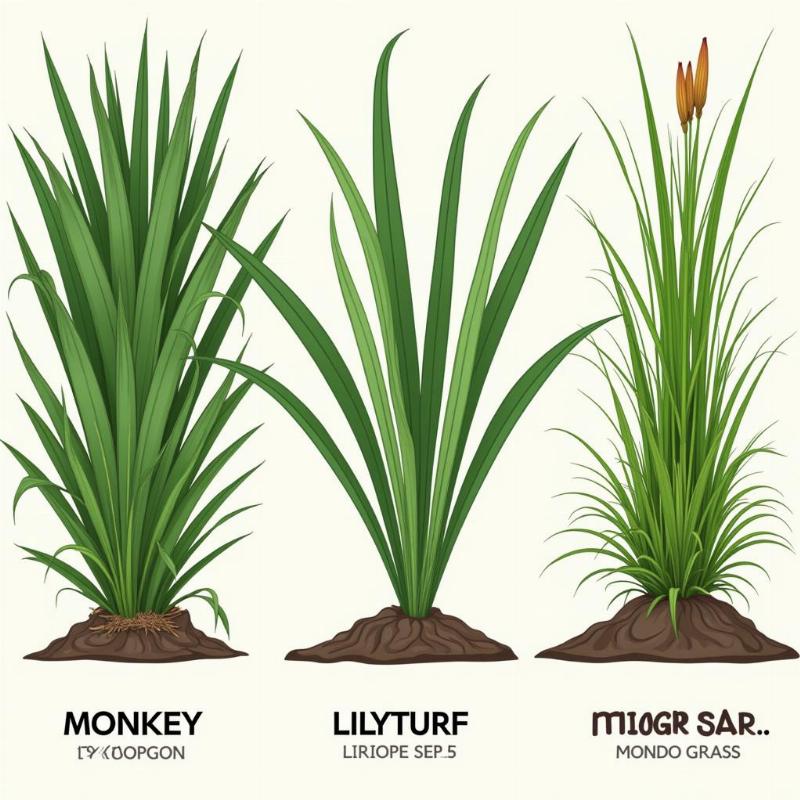Monkey grass, also known as mondo grass, is a popular ornamental plant in many American gardens. Its lush, green foliage adds a touch of elegance to landscapes. But if you’re a dog owner, a crucial question arises: is monkey grass poisonous to dogs? The simple answer is: it depends. While true monkey grass (Ophiopogon japonicus) is generally considered non-toxic to dogs, the plant often referred to as “monkey grass” can sometimes be something else entirely, and some of those look-alikes can be harmful. This article will delve into the details, helping you understand the potential risks and keep your canine companion safe.
Understanding the Confusion Around “Monkey Grass”
The term “monkey grass” is commonly used to describe several different grass-like plants. This can create confusion when trying to assess the potential toxicity for dogs. True monkey grass (Ophiopogon japonicus) is generally safe. However, plants like lilyturf (Liriope spp.) and mondo grass are often called “monkey grass,” and they contain saponins, which can cause mild gastrointestinal upset in dogs if ingested in large quantities. It’s important to correctly identify the plant in your yard to assess the risk.
 Identifying Different Types of Monkey Grass
Identifying Different Types of Monkey Grass
Another plant often mistaken for monkey grass is lily of the valley (Convallaria majalis). Unlike true monkey grass, lily of the valley is highly toxic to dogs and can cause serious heart problems if ingested. Therefore, accurate identification is crucial.
Signs Your Dog May Have Ingested a Toxic Plant
Even non-toxic varieties of monkey grass can cause mild stomach upset if a dog eats a large amount. Watch for symptoms like vomiting, diarrhea, drooling, and loss of appetite. If you suspect your dog has ingested a potentially toxic plant, such as lily of the valley, seek immediate veterinary attention. Symptoms of lily of the valley poisoning can include vomiting, diarrhea, weakness, seizures, and changes in heart rate.
What to Do if Your Dog Eats Monkey Grass
If your dog ingests any amount of a plant you suspect might be a toxic type of “monkey grass,” contact your veterinarian or the ASPCA Animal Poison Control Center immediately. Have a photo of the plant ready to help with identification. For true monkey grass, monitor your dog for any gastrointestinal upset. Offer plenty of fresh water. If symptoms persist or worsen, consult your veterinarian.
Creating a Dog-Friendly Yard
The safest approach is to correctly identify and, if necessary, remove any potentially harmful plants from your yard. Consider replacing them with dog-friendly alternatives. There are many beautiful, non-toxic options available. Regularly inspect your yard for any new growth or plants that may have spread from neighboring properties. Training your dog to avoid chewing on plants can also help minimize risk, but supervision is always the best preventative measure.
Preventing Plant Poisoning in Dogs
- Supervise your dog outdoors: Never leave your dog unattended in areas with potentially toxic plants.
- Train your dog: Teach commands like “leave it” to discourage chewing on plants.
- Research plants: Be familiar with the plants in your yard and their toxicity to dogs.
- Fence off hazardous areas: Create barriers to restrict your dog’s access to areas with poisonous plants.
- Provide plenty of chew toys: A bored dog is more likely to chew on plants.
Conclusion
While true monkey grass is generally safe for dogs, the confusion surrounding the term “monkey grass” necessitates careful identification of the plants in your yard. Being proactive and informed is the best way to ensure your dog’s safety and prevent potential plant poisoning. Always err on the side of caution and contact your veterinarian if you have any concerns about your dog’s health.
FAQ
- What is the most common type of “monkey grass”? Lilyturf (Liriope spp.) is often referred to as monkey grass, but it’s not the true Ophiopogon japonicus.
- Are all types of monkey grass toxic to dogs? True monkey grass is generally safe, while others, like lily of the valley, are highly toxic.
- What should I do if my dog eats a plant I’m unsure about? Contact your veterinarian or the ASPCA Animal Poison Control Center immediately.
- How can I prevent my dog from eating plants? Supervise your dog, train them, and remove any toxic plants from your yard.
- What are some dog-friendly alternatives to monkey grass? Consider planting fescue, clover, or bluegrass.
- What are the signs of plant poisoning in dogs? Symptoms can include vomiting, diarrhea, weakness, seizures, and changes in heart rate.
- Is lily of the valley dangerous for dogs? Yes, lily of the valley is highly toxic to dogs and can cause serious heart problems.
Beautdogs.us is your trusted source for all things dog-related in the United States. We provide expert advice on dog breeds, care, and products. Whether you’re a new dog owner or a seasoned pro, Beautdogs.us has the information you need to keep your canine companion happy and healthy. Contact us today at [email protected] or +1 501-555-7529. Visit us at Beautdogs.us for more expert tips and product recommendations.